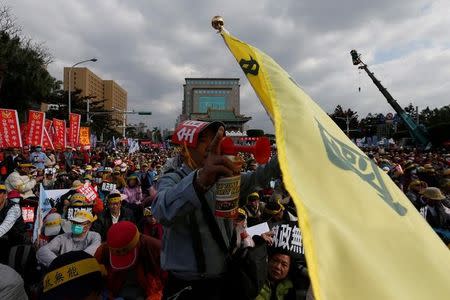TAIPEI, Taiwan — Marking the 20th anniversary of Taiwan’s Labor Pension Reform (勞退新制), dozens of labor unions and migrant worker advocacy groups gathered in front of the Executive Yuan to demand urgent action and comprehensive reform to what they called a “broken” and “unfair” retirement system for both local and migrant workers.
Holding banners and chanting for justice, workers and labor rights advocates called out the government for failing to address the deep flaws in the current pension system, which has left many laborers—especially migrant workers—with no access to retirement benefits, despite years of dedicated service.
📉 “Too Little, Too Late”: Average Pension Only NT$6,000 a Month
One of the core grievances raised is the low employer contribution rate under the new system, which has resulted in local workers receiving an average monthly pension of only NT$6,000. Protesters are demanding an increase in the mandatory employer contribution rate from 6% to 9%, with a plan to gradually raise it to 15% to ensure workers can retire with dignity.
🚫 Migrant Workers Completely Excluded from Pension Coverage
According to statistics from the Ministry of Labor, as of May 2025, Taiwan hosts over 847,000 migrant workers. Of these, more than 534,000 are in industrial and institutional caregiving roles, while around 216,000 are employed as domestic caregivers.
Migrant workers, however, are entirely excluded from the Labor Pension Act (勞工退休金條例). Those under the Labor Standards Act (like industrial workers and institutional caregivers) are still subject to the old retirement system, which migrant workers can rarely qualify for due to rigid contract limits and age requirements.
To qualify under the old system, a worker must:
-
Work at least 15 years and be 55 years old, or
-
Work 25 years, or
-
Work 10 years and be 60 years old
But under current regulations, migrant workers are limited to 3-year contracts, extendable up to a maximum of 12 years, and require employer approval for renewal. These rules make it virtually impossible for them to meet retirement eligibility.
🧾 Government Policies Designed to Benefit Employers
Labor advocates pointed out that in 2006, the Ministry of Labor issued a directive explicitly stating that employers are not obligated to include migrant workers’ salaries when calculating pension contributions. This decision has institutionalized a cost-cutting mechanism for employers at the expense of migrant workers’ rights.
“Migrant workers are treated as disposable, low-cost labor because the system allows it,” said Chen Jung-Jou (陳容柔), a representative of a participating labor organization during the press conference. “The government has laid down the rules to benefit employers—by excluding migrant workers from pension contributions, the system effectively creates cheap, unprotected labor.”
🗣 Demands for Immediate Change
Labor groups put forward two key demands:
1️⃣ Increase employer contribution to labor pensions to 9% immediately, and gradually to 15%
2️⃣ Include all migrant workers—especially domestic caregivers—under the Labor Pension Act without delay
They also proposed that during the transition, employers should settle old system obligations and start contributing to individual pension accounts for migrant workers. For household caregivers, whose employers are often low-income families, the groups called for government subsidies to help with the added pension cost.
⚠️ “No More Empty Promises”
“We’ve heard enough about reform. In 20 years, the government has done nothing substantial,” said the protest organizers. “We will no longer wait. Reforms can’t be delayed any longer.”
As calls for labor justice grow louder, the pressure is now on the government to respond decisively—not just for local workers, but for the hundreds of thousands of migrant workers who have powered Taiwan’s industries and households for decades without security in their old age.



